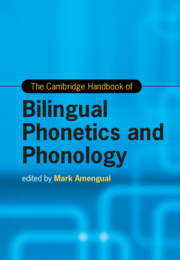Book contents
- The Cambridge Handbook of Bilingual Phonetics and Phonology
- Cambridge Handbooks in Language and Linguistics
- The Cambridge Handbook of Bilingual Phonetics and Phonology
- Copyright page
- Dedication
- Contents
- Figures
- Tables
- Contributors
- Acknowledgments
- Introduction Bilingual Phonetics and Phonology
- Part I Approaches to Bilingual Phonetics and Phonology
- Part II Theoretical Models of Bilingual Phonetics and Phonology
- Part III The Phonetics and Phonology of the Bilingual Child
- Part IV The Phonetics and Phonology of the Bilingual Adult
- Part V The Diversity of Bilingual Speakers
- 22 The Phonetics and Phonology of Early Bilinguals
- 23 The Phonetics and Phonology of Adult L2 Learners in the Classroom
- 24 The Phonetics and Phonology of Adult L2 Learners After Study Abroad
- 25 The Phonetics and Phonology of Heritage Language Speakers
- 26 The Phonetics and Phonology of Indigenous Language Bilinguals
- 27 The Phonology of Bimodal Bilinguals
- 28 Comparing Bilingual and Trilingual Phonetics and Phonology
- Part VI Variables and Outcomes of Bilingual Speech
- Index
- References
27 - The Phonology of Bimodal Bilinguals
from Part V - The Diversity of Bilingual Speakers
Published online by Cambridge University Press: 14 November 2024
- The Cambridge Handbook of Bilingual Phonetics and Phonology
- Cambridge Handbooks in Language and Linguistics
- The Cambridge Handbook of Bilingual Phonetics and Phonology
- Copyright page
- Dedication
- Contents
- Figures
- Tables
- Contributors
- Acknowledgments
- Introduction Bilingual Phonetics and Phonology
- Part I Approaches to Bilingual Phonetics and Phonology
- Part II Theoretical Models of Bilingual Phonetics and Phonology
- Part III The Phonetics and Phonology of the Bilingual Child
- Part IV The Phonetics and Phonology of the Bilingual Adult
- Part V The Diversity of Bilingual Speakers
- 22 The Phonetics and Phonology of Early Bilinguals
- 23 The Phonetics and Phonology of Adult L2 Learners in the Classroom
- 24 The Phonetics and Phonology of Adult L2 Learners After Study Abroad
- 25 The Phonetics and Phonology of Heritage Language Speakers
- 26 The Phonetics and Phonology of Indigenous Language Bilinguals
- 27 The Phonology of Bimodal Bilinguals
- 28 Comparing Bilingual and Trilingual Phonetics and Phonology
- Part VI Variables and Outcomes of Bilingual Speech
- Index
- References
Summary
In this chapter we consider aspects of phonology for bimodal bilinguals, whose languages span distinct modalities (spoken/signed/written). As for other bilinguals, the primary issues concern the representation of the phonology for each language individually, ways that the phonological representations interact with each other (in grammar and in processing), and the development of the two phonologies, for children developing as simultaneous bilinguals or for learners of a second language in a second modality. Research on these topics has been sparse, and some have hardly been explored at all. Findings so far indicate that despite the modality difference between their two languages, phonological interactions still occur for bimodal bilinguals, providing crucial data for linguistic theories about the locus and mechanisms for such interactions, and important practical implications for language learners.
Keywords
- Type
- Chapter
- Information
- The Cambridge Handbook of Bilingual Phonetics and Phonology , pp. 607 - 630Publisher: Cambridge University PressPrint publication year: 2024

